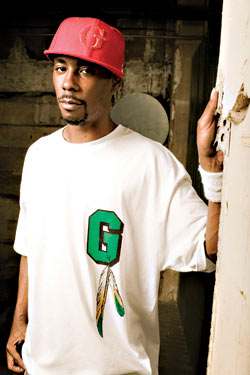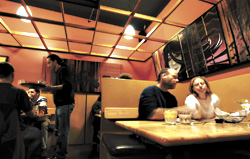Vitamin D (born Derrick Brown) sits with his long legs stretched out, surrounded by state-of-the-art equipment in his studio, the Pharmacy. It’s home to Vita’s rhythm-creating, record producing, and engineering empire, which has turned out beats for the likes of 50 Cent, mixed records for high-caliber MCs like Chali 2na and Gift of Gab, and produced Seattle’s own honey-coated soul singer, Choklate. Though it was just this year that he moved into his current space in the converted OK Hotel building, Vita’s Pharmacy has been in full swing since his days at Garfield High School, when it was housed in his mother’s Central District basement.
“My mom would come downstairs and damn near turn the button: ‘Hey, the motherfuckin’ dishes ain’t washed. I think you need to go handle that. Sorry, homie, I know you’re rappin’, [but] he got to go wash dishes,'” says Vita, his face breaking into a grin. “I lost a beat battle ’cause a homie brought that up. It was so embarrassing to me that I just had to stop!”
Vitamin D is 31 now, but it’s been more than two decades since he programmed his first beat pattern. He was 9 years old, living in Inglewood, a Blood neighborhood in Los Angeles, in the late ’80s. His father, Herman Brown, a Motown studio guitarist, always had gear lying around the house, though he hadn’t taught his son how to use it. But he didn’t need to; Vita figured it out on his own.
“My dad had bought a DMX,” he says. “It’s the drum machine that Run DMC’s Hard Times was programmed with. It was funny; he had Lionel Richie in the house and some Commodore dude, and they were trying to figure out how to work it. They were hitting the buttons, going through the sounds, and I hear the Run DMC clap. When I heard that clap come out, I was like, ‘Oh!’ They were like, ‘Yo, you know what that is?’ I was like, ‘Can I play with it?'”
Vita was hooked. He did whatever he could to get his hands on gear, including navigate through gang territories in the Central District to get home late at night (ironic, considering his family moved to Seattle to escape gang culture).
“We’d go over to my man Cliff’s house,” says Vita. “He had a four-track, a sampler, two turntables, and a drum machine. He lived in the South End. During those gang days, it was dangerous to get to. My mom wasn’t too happy about that. But I had to do what I had to do—it was music.”
As a teenager, Vita paid close attention to his older cousin Eddie Wells, aka Sugar Bear from the Emerald Street Boys, widely regarded as Seattle’s first rap group. Shortly thereafter, Vita started his own groups the Suns of Infinite Thought and the Ghetto Children. He also did live sound, acted, and programmed beats for productions at the Langston Hughes Performing Arts Center, where he worked during the summers, finally saving enough to buy his own drum machine.
The basement studio in his mom’s house soon became pivotal in the early days of Seattle hip-hop. Vita grew along with the scene, cementing his spot as one of Seattle’s most important hip-hop producers and engineers. However, when asked who, in his mind, is the biggest talent to come out of the area, he’s quick to shift the spotlight. “In Seattle? Freakin’ Jake One.”
Perhaps it’s because Jake learned from the best. The two talents (Jake’s résumé includes work with Mos Def, 50 Cent, and Busta Rhymes), who are often mentioned in the same breath when the subject is Seattle hip-hop, met in high school. “Vitamin was basically my main influence when I started producing,” says Jake. “Over the years, he’s helped me in a variety of ways musically. At this point, I think we push each other more than anything, which is good.”
While Vita continues to churn out beats and produce and engineer records, he’s still hustling. The father of three started the Big Tune Beat Battle, a competition that pits area producers against each other as they showcase their beat-making skills, along with longtime friend and manager Jonathan Moore. After receiving Red Bull sponsorship, they took the show on the road to a number of U.S. cities this summer. He’s also got two of his own albums in the works, one to showcase his production skills and one on which he raps. While producing and engineering remain his top priority, it was his love of rap that got him into the game.
“It’s still fun when I get to do it,” says Vita. “It won’t necessarily be about flexing the best lyrics. It’s just me rappin’ ’cause I like to.”






